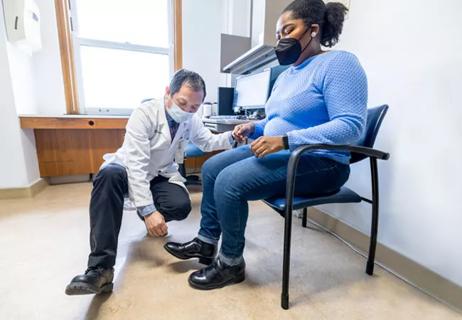An overview of associated antibodies, therapies for antibody-positive disease and the outlook for atypical forms of MG
Podcast content: This podcast is available to listen to online.
Listen to podcast online (https://www.buzzsprout.com/2243576/15289608)
Myasthenia gravis can vary in onset, pattern, progression, severity and underlying cause. However, the FDA has approved therapies only for antibody-positive generalized myasthenia gravis (MG), which can leave it unclear what the best management course is for patients with less typical forms of MG.
Advertisement
Cleveland Clinic is a non-profit academic medical center. Advertising on our site helps support our mission. We do not endorse non-Cleveland Clinic products or services. Policy
“The majority of patients with acquired autoimmune MG have antibodies, yet there are approximately 5% to 10% of patients in whom antibodies cannot be detected,” says Yuebing Li, MD, PhD, a neurologist who leads the Myasthenia Gravis Program in Cleveland Clinic’s Neuromuscular Center. “The belief is that either these patients have antibodies we have not been able to identify or they have antibodies at undetectably low concentrations.”
In the latest episode of Cleveland Clinic’s Neuro Pathways podcast, Dr. Li discusses the unmet needs of individuals with MG, particularly those with seronegative disease. He covers:
Click the podcast player above to listen to the 32-minute episode now, or read on for a short edited excerpt. Check out more Neuro Pathways episodes at clevelandclinic.org/neuropodcast or wherever you get your podcasts.
This activity has been approved for AMA PRA Category 1 Credit™ and ANCC contact hours. After listening to the podcast, you can claim your credit here.
Podcast host Glen Stevens, DO, PhD: I'm glad to hear there’s been a proliferation of new medications for myasthenia gravis. Can you give us a quick overview of them?
Advertisement
Dr. Li: The first approved immunotherapy for myasthenia gravis was eculizumab, which was approved in 2017. It’s a complement inhibitor. Since then, two more complement inhibitors have been approved by FDA: ravulizumab and zilucoplan. Eculizumab and ravulizumab are basically cousins, with a difference of only a few amino acids. They are almost the same drug, except that one is given once every two weeks and the other is given once every eight weeks. Zilucoplan is a small molecule given by subcutaneous injection. Patients can give the injection themselves at home, but it’s a daily injection. All of these therapies work on a complement that mediates the damage in the majority of patients with myasthenia gravis. So that’s why complement inhibition works for this group of patients.
The other class of newer therapies are called neonatal Fc receptor therapy, or FcRn therapy. There are two of these agents: efgartigimod and rozanolixizumab. What they do is basically reduce antibody levels in the blood.
These two kinds of therapies — complement inhibitors and FcRn therapy — have relatively specific mechanisms, but they don't act on the production of the antibodies. So these therapies need to be combined with other treatments if you want to reach remission.
Unfortunately, these newer agents are not effective for everybody. If you look at the pivotal trials, as well as real-life experience, I would say approximately 50% to 60% of patients will respond to one particular therapy, and about 40% to 50% of patients won’t respond very well.
Advertisement
Dr. Stevens: How does the efficacy of these newer medications vary by patients’ antibody status?
Dr. Li: All five of the newer medications — the complement inhibitors and FcRn therapies — are approved for acetylcholine receptor antibody-positive myasthenia gravis. Among the five, only rozanolixizumab has additionally been approved for MuSK antibody-positive myasthenia gravis.
There were seronegative patients in most of the trials of these therapies, but the numbers of patients were small and the differences between the drug and placebo were insufficient. Some post-approval experience has suggested that some of the seronegative patients may also respond to these medications, but larger trials are needed. Trials are now being planned that are targeted specifically to patients with antibody-negative myasthenia gravis.
Advertisement
Advertisement

Retrospective analysis assesses frequency and severity relative to a reference antibiotic

Guidance on instructing patients, treatment selection, impact of disease course and more

Who is at risk? What tests should be ordered?

Guidance for the 5% to 20% of patients with suboptimal response or tolerability

Recommendations on identifying and managing neurodevelopmental and related challenges

Phase 2 trials investigate sitagliptin and methimazole as adjuvant therapies

Aim is for use with clinician oversight to make screening safer and more efficient

Rapid innovation is shaping the deep brain stimulation landscape